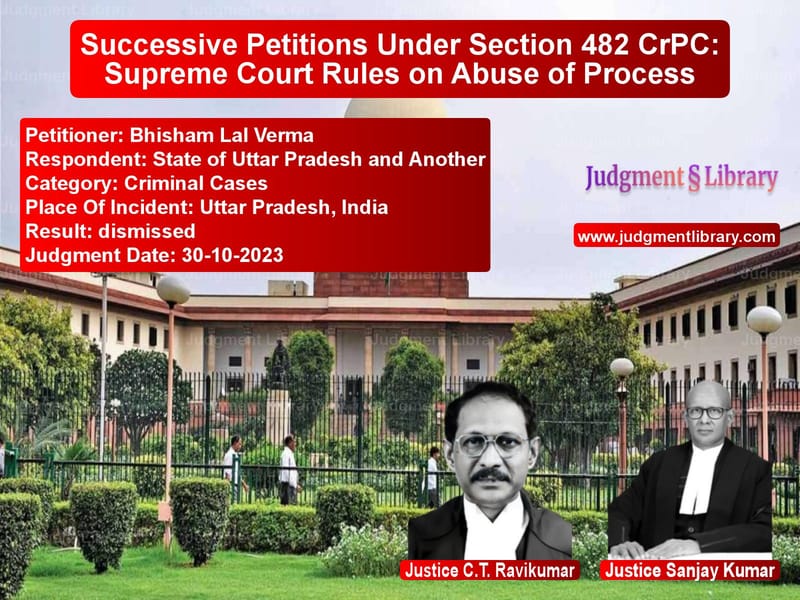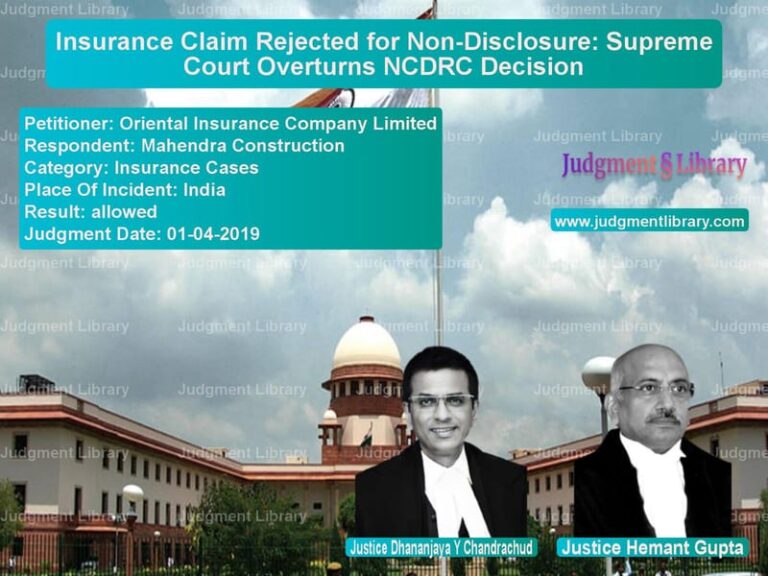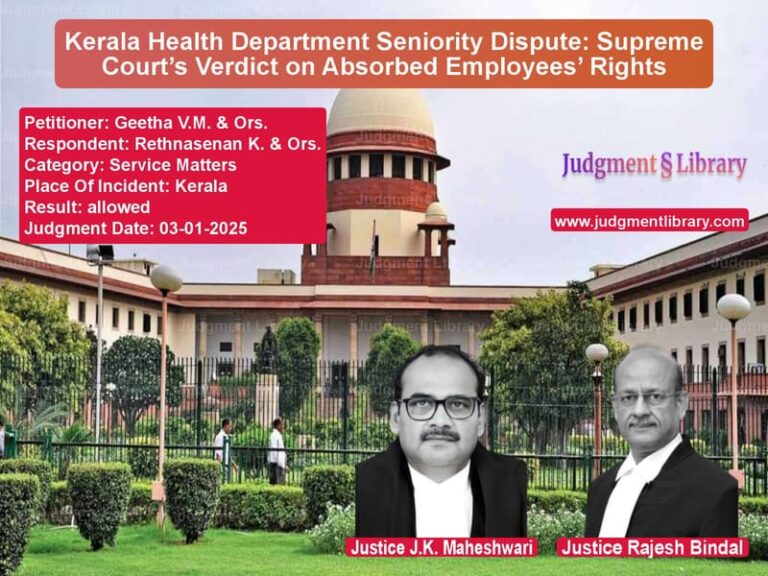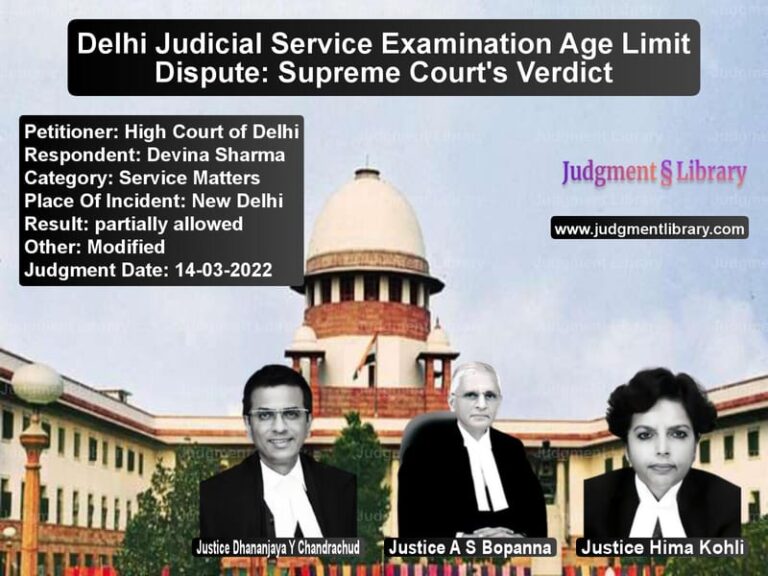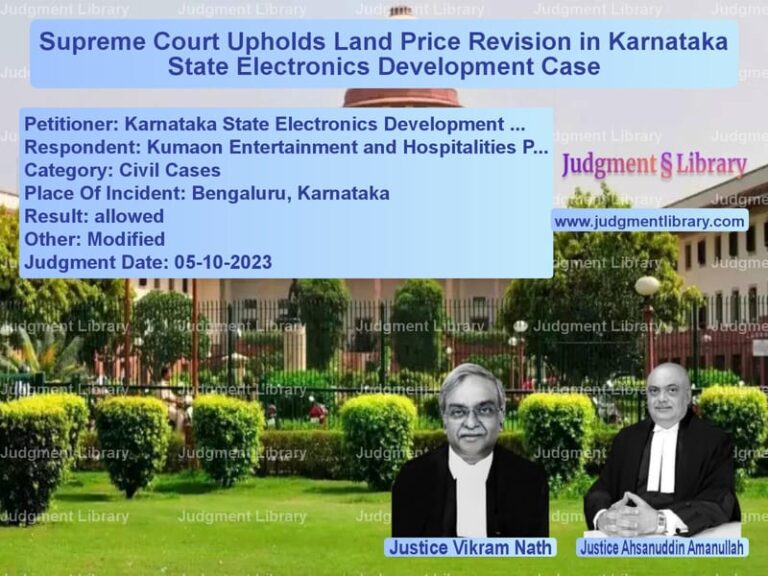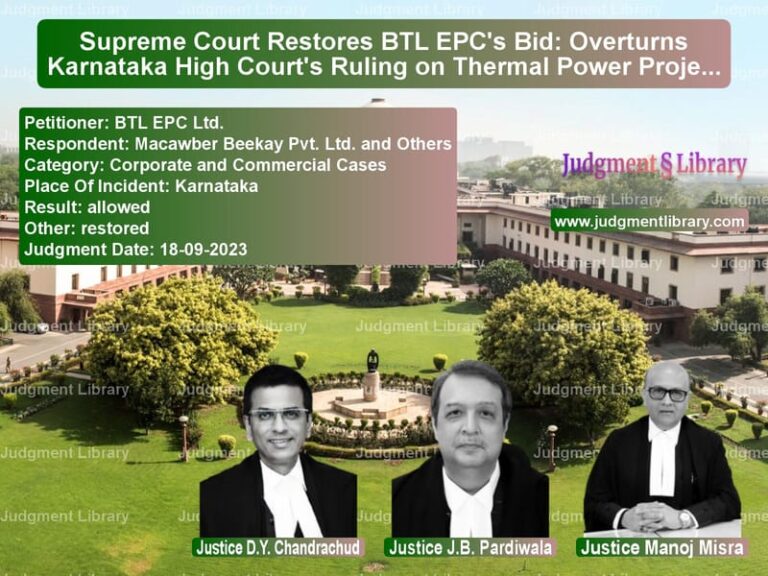Successive Petitions Under Section 482 CrPC: Supreme Court Rules on Abuse of Process
The Supreme Court of India recently ruled in Bhisham Lal Verma v. State of Uttar Pradesh & Another, addressing the maintainability of a second petition under Section 482 of the Code of Criminal Procedure, 1973 (CrPC) on grounds that were available at the time of filing the first petition. The case sets an important precedent regarding the abuse of legal process in criminal proceedings.
Background of the Case
The petitioner, Bhisham Lal Verma, was implicated in a corruption case involving alleged misappropriation of public funds under the Integrated Low-Cost Sanitation Scheme. A complaint dated June 23, 2012, was lodged against him and other accused by the Joint Director, State Urban Development Authority, Uttar Pradesh. The complaint led to the registration of Criminal Case No. 1280 of 2012 under Sections 409, 420, 467, 468, 471, and 120B of the IPC, read with Sections 7 and 13 of the Prevention of Corruption Act, 1988.
On December 3, 2013, the Government of Uttar Pradesh granted sanction to prosecute the petitioner. Subsequently, a charge sheet was filed on April 30, 2015, and the Sessions Judge, Rampur, took cognizance of the case on June 12, 2015. The case was later transferred to the Special Court, Bareilly, as Special Case No. 19 of 2016.
Despite the charge sheet and cognizance order being on record, the petitioner filed his first petition under Section 482 CrPC (Criminal Misc. Application No. 8465 of 2018) before the Allahabad High Court, challenging only the sanction order of December 3, 2013. The High Court dismissed the petition on December 15, 2020, granting the petitioner liberty to challenge the sanction order before the Trial Court.
In 2022, the petitioner filed a second petition under Section 482 CrPC (Criminal Misc. Application No. 2014 of 2022) before the High Court, seeking to quash the charge sheet, the cognizance order, and the entire proceedings in Special Case No. 19 of 2016. The High Court dismissed the second petition on February 20, 2023, holding that the petitioner could not challenge the criminal proceedings in piecemeal and should have raised all available grounds in the first petition.
The petitioner then approached the Supreme Court, challenging the High Court’s ruling.
Legal Issues Raised
- Whether a second petition under Section 482 CrPC is maintainable on grounds that were available at the time of filing the first petition.
- Whether the petitioner was entitled to challenge the charge sheet and cognizance order after failing to do so in the first petition.
- Whether filing successive petitions under Section 482 CrPC amounts to an abuse of the legal process.
Arguments by the Petitioner (Bhisham Lal Verma)
- The second petition was maintainable because it raised separate legal grounds from the first petition.
- The dismissal of the first petition did not preclude the petitioner from challenging the charge sheet and cognizance order at a later stage.
- The High Court erred in applying the principle of res judicata to a petition under Section 482 CrPC.
Arguments by the Respondents (State of Uttar Pradesh & Another)
- The petitioner was well aware of the charge sheet and cognizance order when he filed the first petition in 2018.
- Allowing successive petitions under Section 482 CrPC would enable accused persons to stall criminal proceedings indefinitely.
- The High Court correctly held that the second petition was not maintainable as it attempted to challenge matters that should have been raised earlier.
Supreme Court’s Observations
The Supreme Court analyzed whether a second petition under Section 482 CrPC is maintainable when the grounds raised were available at the time of filing the first petition. The Court referred to several landmark judgments:
Read also: https://judgmentlibrary.com/criminal-case-dismissed-supreme-court-overturns-section-319-crpc-order/
- Mohan Singh v. State of West Bengal (1975) – Held that a subsequent petition under Section 482 CrPC is maintainable if new circumstances arise.
- Simrikhia v. Dolley Mukherjee (1990) – Held that the inherent jurisdiction of the High Court under Section 482 CrPC cannot be used to override statutory provisions.
- S.M.S. Pharmaceuticals Ltd. v. Neeta Bhalla (2007) – Clarified that successive petitions under Section 482 CrPC should only be entertained in exceptional cases.
The Supreme Court made the following key observations:
- A person invoking Section 482 CrPC must raise all available grounds at the first instance and cannot approach the Court with “installment pleas.”
- Permitting successive petitions under Section 482 CrPC would allow accused persons to delay proceedings by raising challenges one by one.
- While there is no absolute bar on filing a second petition under Section 482 CrPC, such petitions should not be entertained if the grounds raised were available earlier.
The Supreme Court agreed with the High Court’s conclusion that the second petition was not maintainable.
Final Judgment
The Supreme Court dismissed the appeal, upholding the High Court’s ruling that:
- The second petition under Section 482 CrPC was not maintainable.
- The petitioner should have raised all grounds, including the challenge to the charge sheet and cognizance order, in the first petition.
- The legal process should not be misused by filing multiple petitions to delay trial proceedings.
Implications of the Judgment
The Supreme Court’s ruling has significant implications for criminal jurisprudence:
- Limits successive petitions under Section 482 CrPC – Prevents accused persons from challenging criminal proceedings in a piecemeal manner.
- Upholds procedural integrity – Ensures that all available grounds are raised in a single petition to avoid unnecessary delays.
- Discourages abuse of the legal process – Prevents the accused from stalling trials by filing multiple petitions at different stages.
- Clarifies judicial discretion – Reaffirms that the High Court has inherent powers but must exercise them judiciously.
The Supreme Court’s decision reinforces the principle that criminal proceedings must be conducted efficiently, without undue delays caused by successive litigation.
Petitioner Name: Bhisham Lal Verma.Respondent Name: State of Uttar Pradesh and Another.Judgment By: Justice C.T. Ravikumar, Justice Sanjay Kumar.Place Of Incident: Uttar Pradesh, India.Judgment Date: 30-10-2023.
Don’t miss out on the full details! Download the complete judgment in PDF format below and gain valuable insights instantly!
Download Judgment: bhisham-lal-verma-vs-state-of-uttar-prade-supreme-court-of-india-judgment-dated-30-10-2023.pdf
Directly Download Judgment: Directly download this Judgment
See all petitions in Fraud and Forgery
See all petitions in Money Laundering Cases
See all petitions in Judgment by C.T. Ravikumar
See all petitions in Judgment by Sanjay Kumar
See all petitions in dismissed
See all petitions in supreme court of India judgments October 2023
See all petitions in 2023 judgments
See all posts in Criminal Cases Category
See all allowed petitions in Criminal Cases Category
See all Dismissed petitions in Criminal Cases Category
See all partially allowed petitions in Criminal Cases Category

